| First meeting | November 19, 1892 Vanderbilt, 20–10 |
|---|---|
| Latest meeting | September 17, 2016 Georgia Tech, 38–7 |
| Next meeting | TBD |
| Trophy | Gold Cowbell (1924–present) |
| Statistics | |
| Meetings total | 38 |
| All-time series | Georgia Tech leads, 20–15–3[1] |
| Largest victory | Georgia Tech, 83–0 (1917) |
| Longest win streak | Vanderbilt, 7 (1929–1935) |
| Current win streak | Georgia Tech, 6 (1966–2016) |
The Georgia Tech–Vanderbilt football rivalry is an American college football rivalry[2][3][4] between the Georgia Tech Yellow Jackets and Vanderbilt Commodores. Both universities are founding members of the Southeastern Conference (SEC) and Southern Conference (SoCon), and Southern Intercollegiate Athletic Association (SIAA). Georgia Tech leads the series all time 20–15–3.
In the 1910s, both programs were coached by men inducted into the College Football Hall of Fame: Dan McGugin and John Heisman. In 2016, a trophy for the contest, the Gold Cowbell, was unearthed after almost 70 years of dormancy. The trophy began in 1924.
History
The schools first meeting was on November 19, 1892. In 1896, both teams joined the Southern Intercollegiate Athletic Association (SIAA).
McGugin and Heisman
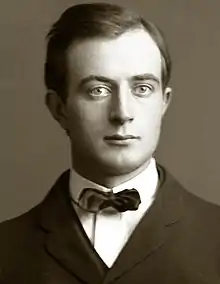
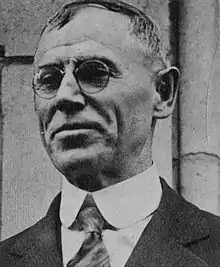
In 1904, Hall of Fame coaches were hired at each school: Dan McGugin at Vanderbilt and John Heisman at Georgia Tech.[lower-alpha 1]
Heisman was already of repute, having won a claim to the 1903 SIAA championship at Clemson the previous season. McGugin was new on the job, but is still the only coach in college football history to win the first three games he ever coached each by 60 points.[5] McGugin would coach at Vanderbilt (with the exception of the 1918 season due to World War I) until the 1930s. Heisman would coach at Georgia Tech until after the 1919 season. William Alexander was hired to succeed Heisman, and he continued to produce strong teams utilizing the Heisman shift. Alexander coached until the 1940s, when he was replaced by Bobby Dodd.
Vanderbilt's oldest rival was Sewanee. One publication claims "The first scouting done in the South was in 1905," before the upcoming Sewanee game, "when Dan McGugin and Captain Innis Brown, of Vanderbilt went to Atlanta to see Sewanee play Georgia Tech."[6]
Both Vanderbilt and Georgia Tech claim a Southern title in 1915. Seven out of eight newspapers voted the SIAA championship to the "point a minute" Vanderbilt Commodores. The Atlanta Constitution declared it a tie between Vanderbilt and Georgia Tech, which was then independent. However, Tech challenged Vandy's championship.[7]
McGugin would win 11 Southern championships in his first 20 seasons coaching the Commodores, including 4 straight from 1904 to 1907, 3 straight from 1910 to 1912, and 3 straight again from 1921 to 1923, as well as the one in 1915. Heisman would win four straight from 1915 to 1918, including a Southern team's first undisputed national title in 1917. McGugin's 1907 team gave Heisman his worst loss at Tech, and Heisman's 1917 team gave McGugin and the Commodores their worst loss ever.
Gold Cowbell trophy
In 2016, a trophy for the contest, the Gold Cowbell,[8] was unearthed after almost 70 years of dormancy.[2][9][10] The winner of the contest was awarded the cowbell trophy tradition starting in 1924, and it was still awarded to the winner of the contest up until the 1960s.[11]
Notable games
1892: First matchup
The first matchup was in 1892, a 20–10 Vanderbilt win. It was Georgia Tech's inaugural season (their second-ever game) and Vanderbilt's third season. The 1892 Vanderbilt team was the oldest in the memory of Grantland Rice. He claimed Phil Connell would be a good player in any era.[12]
1906: Manier scores five touchdowns
The 1906 Vanderbilt team was one of the strongest in its history.[lower-alpha 2] Owsley Manier rushed for five touchdowns on Tech. Sportswriter Alex Lynn wrote after the game that Manier was: "the greatest fullback and all round man ever seen in Atlanta."[14] Lob Brown scored for Tech.
1907: Heisman's worst loss at Tech
The following season, Vanderbilt beat Georgia Tech 54–0. "The rooters stridently called: "We want sixty! We want sixty!"[15] The highlight of the first half came on a triple pass. Sam Costen passed the ball to Honus Craig, Craig passed it to Morton and Morton passed it to Bob Blake, who ran to the side and passed it 25 yards back to Costen. Costen ran the remaining 20 yards for a touchdown.[16]
1910: Morrison Licks Jackets
In 1910, Vanderbilt won a close game over Mississippi 9–2. Late in the first quarter, Ray Morrison returned a punt 90 yards for Vanderbilt's only touchdown.[17][18] John Heisman was the game's field judge, and McGugin did not want to show too much, playing Heisman's Georgia Tech in two weeks.[19] Morrison was the star of the Georgia Tech game too, scoring two touchdowns on road to a 23–0 victory for Vanderbilt.[20]
1917: Vanderbilt's worst loss
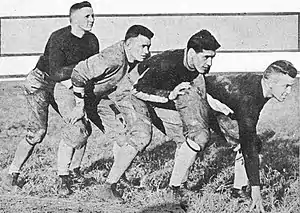
The 1917 Georgia Tech team was the South's first national champion. Despite Vanderbilt having a respectable team, Tech beat Vanderbilt 83–0, the worst loss they have ever suffered. "It was not until 1917 that a Southern team really avenged long-time torment at McGugin's hands. And it took one of history's top backfields–Joe Guyon, Ev Strupper, Al Hill, and Judy Harlan of Georgia Tech–to do it," wrote Edwin Pope.[21] Guyon was the game's star; according to Morgan Blake, "Guyon has been great in all games this year. But Saturday he was the superman".[22]
Vanderbilt captain Alf Adams praised the Tech team: "Tech's magnificent machine won easily over Vanderbilt. It was simply the matter of a splendid eleven winning over an unseasoned, inexperienced team. Tech played hard, clean football, and we were somewhat surprised to meet such a fair, aggressive team, after the reports we had heard. I think that Vanderbilt could have broken that Tech shift if we had had last year's eleven. Being outweighed, Vanderbilt could not check the heavy forwards, or open up the line. Thereby hangs the tale."[23]
1919: Vanderbilt loses in the mud
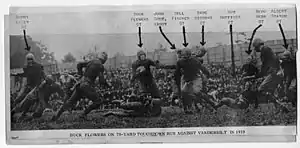
In Heisman's final year at Georgia Tech, both teams were undefeated entering the game. Vanderbilt suffered its only loss on the year in the mud, 20–0. Halfback Buck Flowers and fullback Bill Giaver starred.[24] Flowers had a 78-yard touchdown run. Vanderbilt's captain was Josh Cody.
1920: Flowers and Barron run up a large score
Georgia Tech continued its success with new coach William Alexander. With Flowers and Red Barron in the backfield, SIAA champion Tech defeated Vanderbilt 44–0. During the scoring barrage, Flowers converted a 44-yard drop kick field goal. In the fourth quarter, a fight broke out between Vanderbilt's Gink Hendrick, and some Tech players and fans. No ejections could be made since too many players were involved.
1924: Wakefield's field goal beats Tech
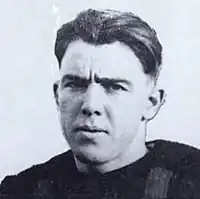
All-American Hek Wakefield scored on a 37-yard drop kick field goal for Vanderbilt's first win in Atlanta since 1906.[25] Wakefield was considered the greatest drop kicker in Vanderbilt history.[26] The Gold Cowbell trophy was introduced after this game.[11]
Vanderbilt elected to start the game with the wind at its back, hoping for an edge in punts which would lead to good field position early. Gil Reese caught one of these punts in the first quarter on the fly and, noticing both of Tech's ends blocked to the ground, raced to within striking distance of the end zone. From there, Hek Wakefield made a drop kick.[27] Wakefield was the star of the game; "He was death on returning punts and when he started around the ends the Tech stars groaned", recalls one account.[28]
Tech's one chance to score came when fullback Douglas Wycoff missed a kick low, partially blocked by Vanderbilt. Hendrix attempted to recover but missed, and Georgia Tech retained possession at the 4-yard line. On first down, a snap from center missed Wycoff, and Vanderbilt fullback Tom Ryan recovered the ball at the 15-yard line, and later punted it away to safety.[29]
1925: Wright should run for governor
Describing the most spectacular play he ever saw, coach Alexander cites one from the 1925 game against Vanderbilt. Doug Wycoff was hurt, and his substitute Dick Wright was sent in with only minutes to go in the game. On a muddy field, Wright ran off tackle and dodged Vanderbilt's safety Gil Reese, "usually a sure tackler," to get the touchdown that gave Tech a 7–0 victory.[30] The yearbook remarked, Wright "should have run for governor of Georgia right after he ran 56 yards against Vandy."
1926: Spears beats Tech
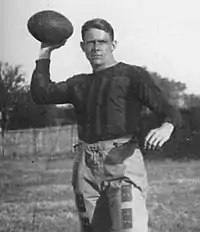
in 1926, Vanderbilt beat Georgia Tech 13–7. Tech scored on an off-tackle play when Carter Barron got loose for a 50-yard run. Bill Spears faked a pass and ran for 24 yards to spark a drive to tie the game at 7, and added two field goals to win the game for Vanderbilt.[31][32]
1927: Spears and Armistead held scoreless
On a wet field, Tech's strong defense held the high scoring Vanderbilt team, including Hall of Famer Bill Spears and high scorer Jimmy Armistead, to a scoreless tie.[33]
1928: National champions end Commodores title hopes
Georgia Tech ended the Jimmy Armistead-led Vanderbilt Commodores' hopes of a southern title with a 19–7 victory.[34] Tech went on to win the Rose Bowl and a national title.
Georgia Tech's first touchdown came on a 45-yard (41 m) pass from Tom Jones to Warner Mizell on a triple pass play.[35] Georgia Tech's next score came on an end run from Mizell. Vanderbilt's lone score came on an 85-yard (78 m) run by lineman Bull Brown after picking up a Stumpy Thomason fumble.[36]
The game has also been credited as the first Vanderbilt football game on the radio.[37]
1931: McGugin's trick
Vanderbilt's All-American center Pete Gracey once said "In my first varsity year, the night before we played Georgia Tech, Coach McGugin casually walked up to me in the lobby of our hotel, put his arm around my shoulder and sorta whispered, "I was with some Atlanta newspapermen this afternoon and I told them you were the finest sophomore center I had ever coached. I hope that I haven't made it embarrassing for you" We beat Tech, 49 to 7. Afterward I talked to seven other players and you know, Coach McGugin told them all the same thing he told me."[38]
1933: Wroton Tallies In Closing Minutes
In 1933, Vanderbilt won a close game 9–6. In the closing minutes, a tipped pass was caught by Vanderbilt's Lang Wroton for a score.[39][40]
1935: Geny wins it with interception
In the fourth quarter, Willie Geny intercepted a pass and raced 67 yards for a touchdown to win the game for Vanderbilt 14–13.[41] This is the last win for Vanderbilt in Atlanta to date, and the season had Vanderbilt's best SEC record.
1937: Tech wins; trophy returns
Georgia Tech beat a previously undefeated Vanderbilt 14–0, and the Golden Cowbell trophy had been recovered after previously being stolen.[11]
1941: Vanderbilt remains unbeaten; Jenkins scores
Vanderbilt's last victory in the rivalry came in 1941 with a 14–7 win in Nashville. Vanderbilt remained the only untied and unbeaten team in the SEC, with SEC Player of the Year Jack Jenkins scoring two touchdowns. Georgia Tech scored with a minute left in the game.[42]
1951: Tech wins by a point in the mud
With just over a minute left and undefeated Georgia Tech up 8–0, Vanderbilt quarterback Bill Wade threw a touchdown pass to Ted Kirkland. Vanderbilt tried an onside kick, but was unsuccessful, and lost 8–7.[43]
1952: National Champions run away with the game in final quarter
The 1952 Georgia Tech team were to be national champions and played Vanderbilt for its homecoming. Vanderbilt was coming off its first win of the season, over a strong Florida team. The first quarter was scoreless, and the score at the half was 6 to 0. After a Vanderbilt fumble, it was 13 to 0, and in the fourth quarter Tech ran away with the game 30 to 0.[44]
2003: Tech beats Vandy in overtime
Georgia Tech beat Vanderbilt in overtime. Jay Cutler led Vanderbilt in rushing.[45]
Game results
| Georgia Tech victories | Vanderbilt victories | Tie games |
| |||||||||||||||||||||||||||||||||||||||||||||||||||||||||||||||||||||||||||||||||||||||||||||||||||||||||||||||||||||||||||||||||||||||||||||||||||||||||||||||||||||||||||||||||||||||||||||||||||||||||||||||||||||||||||||||||||||||||||||||||||||||||||||||||||||||||||||||||||||||||||||||||
See also
Notes
- ↑ Hall of Fame coach Mike Donahue was hired at Auburn. Every season from 1904 until 1923, with the exception of 1909, one of either Vanderbilt, Tech, or Auburn claims a Southern championship. Auburn and Georgia Tech are also rivals.
- ↑ In 1911, Innis Brown rated the 1906 team as the best the South ever had.[13]
References
- 1 2 "Winsipedia - Georgia Tech Yellow Jackets vs. Vanderbilt Commodores football series history". Winsipedia.
- 1 2 "Vanderbilt and Georgia Tech will renew forgotten cowbell rivalry". 16 September 2016.
- ↑ "Vanderbilt and Georgia Tech will battle for the Gold Cowbell". Vandy247.
- ↑ "Mehre Afraid of Florida, best in Four Years Play". Nashville Banner. November 3, 1933. p. 20 – via Newspapers.com.

- ↑ Scott, Richard (2008). SEC Football: 75 Years of Pride and Passion. p.24
- ↑ George Allen (February 2009). How to Scout Football. Martino. p. 3. ISBN 9781578987290.
- ↑ "Georgia Tech Claims S.I.A.A. Championship". The Tennessean. November 26, 1915. p. 8. Retrieved September 23, 2015 – via Newspapers.com.

- ↑ "College Football News, Videos, Scores, Teams, Standings, Stats". FOX Sports.
- ↑ Sparks, Adam. "Vanderbilt, Georgia Tech to play for long-lost cowbell trophy". The Tennessean.
- ↑ "Georgia Tech and Vanderbilt are playing for a Cowbell trophy". 16 September 2016.
- 1 2 3 "Inside The Chart: The Cowbell". Georgia Tech Yellow Jackets. September 15, 2016.
- ↑ Grantland Rice (November 24, 1937). "Two of Year's Outstanding Games in South This Week". Lincoln Evening Journal. p. 12. Retrieved May 13, 2015 – via Newspapers.com.

- ↑ "Brown Calls Vanderbilt '06 Best Eleven South Ever Had". Atlanta Constitution. February 19, 1911. p. 52. Archived from the original on April 2, 2015. Retrieved March 8, 2015 – via Newspapers.com.

- ↑ Alex Lynn (November 18, 1906). "Brown's Toe and the Wet Cave Score". Atlanta Constitution. p. 1. Archived from the original on March 4, 2016. Retrieved May 11, 2015 – via Newspapers.com.

- ↑ Vanderbilt University (1908). Vanderbilt University Quarterly. Vol. 8. p. 50.
- ↑ Grantland Rice (November 17, 1907). "Tech Beaten Down". The Tennessean. p. 9. Retrieved April 9, 2016 – via Newspapers.com.

- ↑ Grantland Rice (October 30, 1910). "Morrison's Brilliant Ninety-Yard Dash The Main Factor In Mississippi's 9-2 Defeat". The Tennessean. p. 8. Retrieved May 10, 2016 – via Newspapers.com.

- ↑ "Vandy Outlucked Them". The Houston Post. October 30, 1910. p. 19. Retrieved May 6, 2016 – via Newspapers.com.

- ↑ Vanderbilt University 1910, p. 305
- ↑ "Ray Morrison Licks Jackets". The Atlanta Constitution. November 13, 1910. p. 2. Retrieved May 10, 2016 – via Newspapers.com.

- ↑ Edwin Pope (1956). Football's Greatest Coaches. p. 344.
- ↑ McCarty, Bernie (February 1988). "Georgia Tech's 1917 backfield, better than the Four Horsemen: Part 1" (PDF). College Football Historical Society Newsletter. 1 (3): 5. Archived from the original (PDF) on March 4, 2016.
- ↑ "Vanderbilt Completely Overwhelmed" (PDF). The Technique. November 6, 1917. p. 4.
- ↑ "Georgia Tech Swamps Vanderbilt, 20 to 0". The Washington Post. October 19, 1919. p. 23. Retrieved May 13, 2016 – via Newspapers.com.

- ↑ Vanderbilt Football 2014 Fact Book Archived 2014-08-19 at the Wayback Machine, Vanderbilt University, Nashville, Tennessee, pp. 125, 137, 142, 151 (2014). Retrieved August 17, 2014.
- ↑ "Hek Wakefield Funeral Today". The Tennessean. November 20, 1962. p. 34. Retrieved July 7, 2016 – via Newspapers.com.

- ↑ "Strategy of Commodores Defeats Tech". Atlanta Constitution. November 16, 1924.
- ↑ Georgia Tech Alumnus. Atlanta. December 1924. p. 79.
{{cite book}}: CS1 maint: location missing publisher (link) - ↑ Russell, Fred, and Maxwell Edward Benson. Fifty Years of Vanderbilt Football. Nashville, Tennessee, 1938, p. 42-43
- ↑ W. A. Alexander (1926). "Forty-Five Yards for Georgia Tech" (PDF). Kansas City Star.
- ↑ Woodruff 1928, p. 165
- ↑ "VANDERBILT BEATS TENNESSEE, 20 TO 3; Spears and Hendrix Star in Hard-Fought Contest on Nashville Gridion". The New York Times. November 14, 1926.
- ↑ Mark Purcell (November 1988). "Spears and Vandy excitement in 1927" (PDF). College Football Historical Society. 2 (1). Archived from the original (PDF) on 2016-09-11. Retrieved 2018-08-03.
- ↑ "Hopes of Vandy in South Circuit Wrecked Today". The Waco News-Tribune. November 11, 1928. p. 6. Retrieved March 1, 2016 – via Newspapers.com.

- ↑ "Tornado Takes Places As Grid King of South". The Anniston Star. November 11, 1928. p. 11. Retrieved May 1, 2016 – via Newspapers.com.

- ↑ "Georgia Tech 11 Whips Vanderbilt". The Oregon Statesman. November 11, 1928. p. 9. Retrieved March 1, 2016 – via Newspapers.com.

- ↑ "VU plays first night game in 1933". Vanderbilt University Athletics - Official Athletics Website. October 22, 2008.
- ↑ Traughber, Bill (2011). Vanderbilt Football: Tales of Commodore Gridiron History. The History Press. p. 34. ISBN 978-1-60949-423-0.
- ↑ "Georgia Tech Alumni Magazine Vol. 12, No. 02 1933". Issuu. 20 December 2013.
- ↑ "VANDERBILT ON TOP, 9-6.; Halts Georgia Tech as Wroton Tallies In Closing Minutes". The New York Times. November 5, 1933.
- ↑ "VANDERBILT HALTS GEORGIA TECH, 14-13; Geny Intercepts Pass to Dash 67 Yards and Tie Count in the Final Quarter. KONEMAN GOES 57 YARDS Gives Engineers Early Lead, but Commodores Retaliate With Drive From Their Goal". The New York Times. November 3, 1935.
- ↑ Escar Thompson (October 19, 1941). "Vanderbilt Remains Unbeaten". The Jackson Sun. p. 12 – via Newspapers.com.
- ↑ "1951-10-27 – Georgia Tech at Vanderbilt | Georgia Tech Ticket Stubs".
- ↑ "1952-10-25 – Georgia Tech vs. Vanderbilt | Georgia Tech Ticket Stubs".
- ↑ "Vanderbilt Falls In Overtime to Georgia Tech". Vanderbilt University Athletics - Official Athletics Website. September 27, 2003.
- ↑ "Georgia Tech vs Vanderbilt Series History - College Football Database". atr.cfrc.com.
- Vanderbilt University (1910). Vanderbilt University Quarterly. Vol. 10.
- Woodruff, Fuzzy (1928). A History of Southern Football 1890–1928. Vol. 3.

_logo.svg.png.webp)